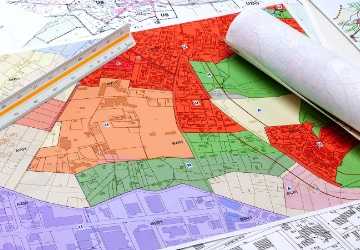Understanding Property Zoning: What Home Buyers Need to Know
Confused about property zoning? Learn how it impacts your home purchase. Our guide simplifies zoning laws, helping you make informed decisions.
Purchasing a house is a beautiful experience everyone looks forward to, but it has challenges. You have often overlooked hurdles in property zoning laws. Many buyers complain that these regulations may be challenging to deal with.
Think about it. You get the house of your choice but then realize later that you cannot use it as you intended. You may wish to start a home-based business, yet the ordinance disapproves of it, or you plan to construct an extension, but the law does not permit it.
Such surprises may lead to frustration, additional expenses, and sometimes even a legal issue—enough to give one a spinning head!
But don't worry. We're here to help.
This blog post will briefly discuss property zoning in terms of basic information. By the end of this article, the reader will be equipped with the necessary knowledge to approach these areas more confidently.
Are you ready to take on the title of a zoning pro?
Let's dive in!
Why Is It Important to Know About Property Zoning
Let’s discuss why zoning is essential. It is not just several standards. Well, it is necessary for anyone who wants to buy a house.
First, it informs you of the permitted uses for your property or any prohibitions. Are you considering starting a business from home or your garage? Zoning laws will indicate whether or not that is acceptable.
These rules also relate to the value of your property. A home in an exclusively residential zone could be valued more than one in a commercial zone. This all depends on what the buyers are in search of.
Moreover, just knowing the zoning keeps one on the legal side. No one wishes to be on the wrong side of the law or wake up to a legal mess just because he does not know the law.
It is incredible how zoning can help you cut costs, spend less time, and reduce stress. It plays a crucial role in efficient decision-making when looking for a house. Take advantage of this step!

Critical Aspects of Property Zoning for Home Buyers
It is now time to examine the significant sections of property zoning that any homebuyer should know. Some things you will read here might sound boring but essential.
1. Types of Zoning
Let's take a closer look at the possible types of zoning you may encounter.
You already know some residential zoning, which includes houses, apartments, and condominiums.
However, it also dictates where one can reside and to what extent; it defines how many residences are permissible in a given area and what structures are acceptable.
Commercial zoning is for commercial usage and is mainly for business people. To those interested in a property in these areas, consider the implications of the same on your home. And, of course, remember the noise: living next to a shopping center might be quite noisy for some people.
Garage zoning is for factories and business establishments. Such areas can be quite noisy and sometimes may have related environmental concerns. People usually prefer to avoid building or buying a house in these areas, but it is helpful to have this information.
Agricultural zoning is used for farming and other related activities. If you have your eyes set on a country home, there are some things you need to learn about the construction of houses on this form of land.
2. Zoning Codes and Regulations
Here is some rather significant information about the zoning regulations.
Zoning ordinances are the local ordinances that define how land can be used. The following should be reviewed before you purchase the property to ensure you are not contravening the law on what you intend to do with the property.
These setback requirements may seem uninteresting, but they are significant. These rules explain how close your house should be to the neighbor's or boundary wall. This is relevant if you consider expanding your home in the future.
As their name suggests, height restrictions limit structures' height. Look at these if you want information on adding a second story to your home someday.
3. Zoning Variances and Exceptions
Occasionally, it may be necessary to work outside the procedural book. That is why there are variances. The variances are then used to identify the cost difference between the actual and budgeted amounts.
To apply for a variance implies requesting permission to operate outside the set zoning laws. They are difficult to come by, so you must understand what they entail before relying on one.
Another mechanism for doing something that is not permissible within a zone is through a conditional use permit. These usually entail the involvement of your neighbors to voice their opinions, so be ready for that.
A nonconforming use is a fancy word for a use that does not meet the current zoning ordinances but was allowed earlier. When considering one of these, learn your rights and restrictions.
4. Effect on the Property Value and Resale Price
Zoning is the legal division of a particular area where one resides, operates a business, or owns property; it also determines the property's worth.
Generally, homes in residential zones are more valuable than those in industrial zones. But, of course, it can be challenging. Factors like location, local demand, and many more make it possible or easy to carry out an enterprise.
Zoning also plays a significant role in reselling. A property zoned to conform to most clients' desires will generally be more saleable.
5. Amendments to the Zoning Code and Subsequent Use
In conclusion, remember that zoning is not cast in concrete.
Zones can be altered, which implies that the uses allowed in the areas can be changed. You should also attend local newspapers and government meetings where such decisions may be discussed.
Another important elements is to look through your local government's plans for further development. These can help you anticipate some aspects that may change concerning your property in the future.
Take Control of Your Home Buying Journey
With the knowledge acquired in zoning, the time came to apply the information acquired from this book. Here is what you should know so you are aware when buying a home.
Do your homework. Before you buy a specific piece of land, check the zoning laws.
If you need help understanding something, ask questions. Local agents, planning offices, and zoning officers are the right people to consult.
This is a friendly reminder that your chosen house should fit your dream. Ensure the zoning permits your intentions to work from home or begin a small business.
Thus, be wise, knowledgeable, and responsible for your home-buying process. With the correct information, you can secure a home that is perfect for you.

Frequently Asked Questions
Q. What is property zoning?
Ans. Zoning, therefore, can be defined as regulating the use of land and buildings. It states what is constructible and how the different zones may be utilized. Such rules ensure the proper ordering of areas inhabited by people and avoid clashes between various categories of buildings.
Q. How do I check zoning for a property?
Ans. The best and first point of contact is with your local zoning office. Please pick up the phone or send them a visit to their web page. Today, most cities have online maps that display zoning information. They can also get assistance from your real estate agent if you use one.
Q. Can zoning change after I buy a property?
Ans. Yes, it can. Local authorities sometimes modify the zoning plan. To be informed, one should follow the local media and attend community meetings. It's good to know that significant changes don't happen overnight, but sometimes they do and kick off from somewhere.
Q. Do I need a permit for home renovations?
Ans. Most likely, yes. It may require some approvals, even if the changes are minor. Before undertaking any job, consult with the local building authority. It is best to inquire first rather than to be penalized or to have to reverse something later.